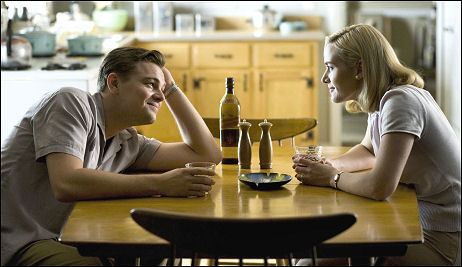In serious artistic-cred terms (as opposed to counting hands in a high-school popularity poll), the Best Picture race has been radically altered by the arrival of Revolutionary Road. It is the new King Shit among the ’08 power-punchers — films that reflect some aspect of the real grit out there and say “this could be about you.” As I wrote last night, it’s “the strongest heavyweight drama I’ve seen all year so far…a corrosive and heartbreaking masterwork.”
As I also wrote yesterday, “A Best Picture winner has to be a manifestation of someone’s idea of a great, drop-dead, grand-or-penetrating-theme art film or it has to get people emotionally in a big way. Sorry, but them’s the rules.” Revolutionary Road obviously treds familiar ground (the old suburbia-sucks, let-me-outta-here mantra), but without question it’s a manifestation of the latter.
The only other film that truly towers over the rest is the film that very few of the elite critics will stand behind because (a) they have eyes but will not see or (b) they lack the cojones to stand up to the conventional wisdom that a film has to be at least semi-commercial to be Oscar-worthy — Steven Soderbergh‘s Che. Re-order your thinking on this concept lest you imperil your immortal souls. Choose your heroes and champions based on the criteria of the Movie Gods, not the likes and dislikes of the oafs and serfs who pay to see movies down at the mall….good heavens.
Soderbergh’s lack of interest in even beginning to attempt to “entertain” the popcorn-munchers is not a plus sign in and of itself, but critics and smart industry viewers should at least be able to see what’s going on here and at least give credit where due. Che is the pure and even made majestic, the telling of a two-act story that could only have been lessened by being shaped into “drama.” It is naturalism in the rough, unpretentious verite magnificence, poetry in the details, an au natural hang-out-with-a-legendary-figure presented as a form of truth both literal and eternal. And yet it is so stand-alone “out there” that you can’t really call it drama.

Besides these two you have Slumdog Millionaire, a rouser that is obviously getting people emotionally. A fevered and sweeping Dickens tale, but, in the view of some, a bit too manipulative and willfully “extreme” to register alongside the cinematic distinctions of Revolutionary Road and Che. It may be the front-runner right now, and it may win the Best Picture Oscar, but we’ll see.
And Doubt, which is exquisite and immaculate on its own stage-play-transferred-into-cinematic-tension terms but isn’t quite as jolting or emotionally affecting or profound, even, as (no offense to John Patrick Shanley, Meryl Streep, Roger Deakins, Philip Seymour Hoffman and everyone else involved) Revolutionary Road .
Milk doesn’t have the heft or the chops or the emotional pull of Revolutionary Road or Che — I’m sorry but as strong and earnest and enhanced by Sean Penn as it is, Milk is a marginally lesser film than these two.
Frost/Nixon is a tight, well-written and admirably assembled drama that delivers a metaphor about the tendency of truth to hide its face until all other options and avenues have been exhausted. But it is primarily a performance film by the expert technique and sadness of Frank Langella‘s Richard Nixon. It’s not the stunner and soul-shaker that Revolutionary Road is, and not the majestic “other” that Che is. I’m sorry but there it is.
I have yet to see Gran Torino, Benjamin Button and The Reader so we’ll see what happens there.
I will be pledging allegiance and affection for Tom McCarthy‘s The Visitor from now to Kingdom Come. WALL*E is brilliant but it is the winner of the Best Animated Feature Oscar — it needs to stay on its own side of the Rio Grande. And if they gave an Oscar to the Best Tweener Drama of the Year, Rod Lurie‘s Nothing But the Truth would win hands down.









